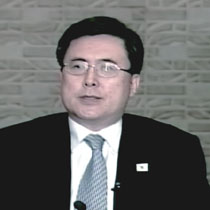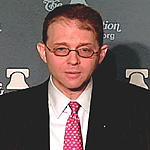2007年VOA标准英语-Seoul Says Food Aid to North Korea Depends on N(在线收听)
Washington
24 April 2007
South Korean officials say their agreement Sunday to send rice to help North Korea feed its people will only go through if Pyongyang honors a pledge to begin dismantling its nuclear weapons program. And President Bush's special envoy monitoring human rights in North Korea says Pyongyang must change its ways before normalization of U.S. relations can take place. VOA's Leta Hong Fincher has more.
Seoul says its decision to send 400,000 tons of rice to impoverished North Korea is not just a humanitarian gesture.
South Korean officials say the aid agreement they signed this week (4/22) depends on whether North Korea begins dismantling its nuclear-weapons program, as promised.
 |
| Chin Dong-soo |
Under that deal reached at six-party arms talks, North Korea was to close its main nuclear reactor by April 14th and allow U.N. nuclear inspectors into the country, but this has not happened. Pyongyang says this is because it has been unable to regain control of $25 million from a previously frozen account at a bank in Macau. The United States said the North Korean funds at Banco Delta Asia were part of an illegal money-laundering scheme, but it has lifted the "freeze" on the account.
 |
| Jay Lefkowitz |
"I certainly don't expect, unless there's a change in policy, that we're going to have any transparency in terms of how they spend that money, and I think it's incumbent on us to insist precisely on that," he says.
Lefkowitz told the conservative Heritage Foundation research group in Washington that North Korea must remove its curbs on freedom of expression, assembly and religion before the United States will normalize relations with the communist state.
"The agreement makes clear that we are to begin holding normalization talks, and the Japanese and the North Koreans are to begin holding normalization talks, and I think these human-rights issues are very much front and center in both of those normalization dialogues," said Lefkowitz.
Some conservatives have criticized the Bush administration for appearing to drop its hard-line stance on North Korean human-rights abuses in order to resolve the nuclear standoff with Pyongyang.
Lefkowitz says the United States and its allies can do more to push North Korea to treat its citizens better. "There is no question that there's a great deal more that we can be doing, and frankly [this] requires work throughout the administration – leadership not only by the president, who is very committed to this agenda (I see that every time I talk to him about it) – but leadership throughout the government in elevating this issue, not only through the six-party talks but also, with our other friends and allies in the region."
The February six-party accord calls for talks between the United States and North Korea to normalize ties after decades of hostility, in exchange for Pyongyang's abandonment of nuclear weapons.